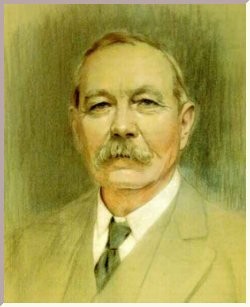 Arthur Ignatius Conan Doyle
Arthur Ignatius Conan Doyle was born on 22nd May 1859, in Edinburgh, Scotland. He was born at Picardy Place in the city centre and a statue commemorating his life stands there to this day in recognition of one of Scotland’s most famous authors.
Doyle came from a large and rich family of Irish-Catholic descent. He was one of ten children but only one of seven who survived to adulthood. His father, Charles, was a civil servant and chronic alcoholic. His mother, Mary, was a well-educated and dominant woman with a deep interest in literature.
Shortly after he turned nine, some of the wealthier members of the Doyle family offered to pay for Arthur’s studies. To his horror, he was enrolled at a Jesuit boarding school in England. Doyle rejected Catholicism and became an agnostic.
On his return he embarked on a medical career at the University of Edinburgh. While there he came into contact with upcoming authors James Barrie and Robert Louis Stevenson before graduating with a Bachelor of Medicine and Master of Surgery degree.
In August of 1885, he married a young woman called Louisa Hawkins and a year later wrote a novel,
A Tangled Skein. The novel had two main characters called Sheridan Hope and Ormond Sacker, and when it was published two years later in Beeton's Christmas Annual under the title
A Study in Scarlet, readers had been unwittingly introduced to the immortal Sherlock Holmes and Dr. Watson.
In August of 1889 Doyle had dinner with Oscar Wilde, and as a result of this meeting he was commissioned to write a short novel.
The Sign of Four was published in England and the US in February of 1890 and was instrumental in establishing Sherlock Holmes and Arthur Conan Doyle in the annals of literary history.
In 1892 Louisa gave birth to a son, who they named Kingsley. A year later, in spite of everyone's pleas, Doyle decided to get rid of Holmes and Moriarty. His decision was made while on a trip to Switzerland, and in
The Final Problem, he sent them plunging to their deaths at The Reichenbach Falls. As a result, twenty thousand readers cancelled their subscriptions to The Strand Magazine.
Now free of his medical career and from a fictional character who overshadowed what he considered his finer work, Doyle immersed himself in other writing activities but failed to notice the serious deterioration of his wife's health. By the time he did, Louisa was diagnosed with Tuberculosis and was given only a few months more to live. His father’s death soon after, sent Doyle into a depression, which caused him to become more and more fascinated by Spiritualism and the occult. It was around this time he started an affair with a young woman called Jean Leckie.
When the Boer War started, Doyle declared to his horrified family his intention to enlist. His weight and age prevented him, so he volunteered as a medical doctor and sailed to Africa in February of 1900.
When he returned to England, Doyle threw himself into politics and ran for a Central Edinburgh seat. Having been raised by Jesuits though, he was unfairly accused of being a Catholic bigot and lost the election by a narrow margin
A year later, King Edward VII knighted Doyle for services rendered to the Crown during the Boer War. Rumours suggest the King was an avid Holmes fan and that Doyle’s honour was given to encourage him to write new stories.
Louisa died in his arms on the 4th of July 1906 and Doyle slipped into a debilitating state of depression. When he came out of it he married Jean Leckie on September 18th 1907. They went on to have one child, a daughter Jean, who was born in 1912.
When World War 1 broke out, Doyle, then fifty-five, offered to enlist again. He was denied once more but when the navy lost more than a thousand men in one day, Doyle suggested to the War Office that "inflatable rubber belts and lifeboats" and "body armour" might help to protect the soldiers. Most officials found him irritating, though Winston Churchill wrote to thank him for his ideas.
The toll of the war was cruel on Doyle. He lost his son, Kingsley, his brother, two brothers-in-law and two nephews and with financial problems building once more, he published
The Casebook of Sherlock Holmes in 1928.
In the autumn of 1929, and in spite of being diagnosed with Angina Pectoris, Doyle toured northern Europe. When he returned, he was so ill he was bedridden. One cold spring day in 1930 he went unseen into the garden and suffered a heart attack. When he was found on the ground, he was lying with one hand clutching his heart and the other holding a single white snowdrop.
Arthur Conan Doyle died on July 7th 1930, surrounded by his family. His last words before departing for "the greatest and most glorious adventure of all," were addressed to his wife, when he whispered, "You are wonderful."

